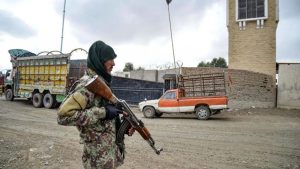Kabul/Islamabad।
The Taliban government in Afghanistan has confirmed that its forces carried out cross-border attacks targeting Pakistani military positions, claiming that 58 Pakistani soldiers were killed and about 30 others wounded in what it described as a “retaliatory action.”
According to Taliban spokesman Zabihullah Mujahid, the attacks came after Pakistan allegedly violated Afghan airspace and bombed a civilian market in Paktika province on Thursday. The Taliban said it had “no choice but to respond decisively” to protect its sovereignty.
Heavy Exchange of Fire Across Mountainous Border
Both sides reportedly used small arms and heavy artillery in multiple areas along the rugged Kunar-Kurram border region, BBC sources confirmed.
A Pakistani security source said the firing was reported in Angoor Adda, Bajaur, Kurram, Dir, Chitral, and Baramcha, some of the most volatile stretches of the Pakistan-Afghanistan frontier.
A police official stationed near the Zero Point in Pakistan’s Kurram district told the BBC that “intense firing from the Afghan side began around 10:00 p.m. local time and continued for several hours.”
He added that reports of gunfire and shelling were received from “multiple locations along the border.”
Taliban Casualties Also Reported
Taliban spokesman Mujahid said nine Taliban fighters had been killed and 16–18 others injured during the clashes.
Speaking at a press conference in New Delhi — where he was accompanying Afghan Foreign Minister Amir Khan Muttaqi on a rare visit to India — Mujahid said:
“Afghanistan has no problem with Pakistan’s people or its leadership, but some groups in Pakistan are trying to spoil the situation. Afghanistan has the right to defend its borders and respond to violations.”
Pakistan Condemns the Attacks as “Unprovoked”
Pakistan’s Interior Minister Mohsin Naqvi condemned the Taliban’s assault, calling it “unprovoked firing on civilians” and a “blatant violation of international law.”
He warned that Pakistan would respond “with a stone for every brick.”
“Afghanistan is playing a dangerous game of fire and blood,” Naqvi wrote on X (formerly Twitter), adding that Islamabad’s forces would take “all necessary measures” to safeguard Pakistani lives and territory.
While Pakistan’s military has not issued an official statement, senior defense officials confirmed that the country’s border crossings with Afghanistan have been closed following the escalation.
Background: Rising Tensions and Mutual Accusations
Tensions between Islamabad and Kabul have been simmering for months.
Pakistan has repeatedly accused the Afghan Taliban of harboring the Tehreek-e-Taliban Pakistan (TTP) — a militant group responsible for numerous attacks inside Pakistan — and allowing it to operate freely from Afghan soil.
The Taliban government in Kabul has consistently denied these allegations, asserting that it does not allow any group to use Afghanistan’s territory against another country.
Last week, Kabul accused Pakistan of violating its sovereignty after two loud explosions were heard in the Afghan capital. The Taliban’s Defence Ministry said that Pakistani aircraft bombed a civilian marketplace in Paktika province, destroying several shops.
Locals told BBC Pashto that “the explosions were so powerful that several shops and vehicles caught fire instantly.”
Regional and Diplomatic Reactions
Saudi Arabia — which recently signed a mutual defence pact with Pakistan — urged both sides to exercise restraint and avoid further escalation.
Qatar also expressed concern over the deteriorating situation, calling on Kabul and Islamabad to “prioritise dialogue, diplomacy, and restraint.”
The United Nations has not yet issued an official statement, but regional analysts warn that a prolonged military confrontation could severely disrupt cross-border trade and humanitarian supply routes, particularly through Torkham and Spin Boldak, both vital crossings for regional commerce.
A Fragile Moment for the Taliban Government
The clashes come during a diplomatically sensitive period for Afghanistan.
Foreign Minister Amir Khan Muttaqi’s week-long visit to India — his first since the Taliban’s return to power in 2021 — had been seen as a major step toward thawing relations between Kabul and New Delhi.
India, which had shut down its embassy in 2021, recently announced plans to reopen its diplomatic mission in Kabul, signaling a cautious re-engagement with the Taliban-led government.
However, observers now fear that the border crisis with Pakistan could derail these tentative diplomatic gains and further isolate the Taliban internationally.
The latest round of deadly clashes underscores the deep mistrust that continues to define Afghanistan-Pakistan relations.
While both sides blame each other for harboring militants and violating sovereignty, the renewed violence risks pushing two already fragile nations toward a broader confrontation.
With dozens dead on both sides, closed borders, and rising nationalist rhetoric in Islamabad and Kabul, analysts warn that without urgent mediation, the border may again become a flashpoint for a regional crisis.
About Author
You may also like
-
Shimron Hetmyer on the Verge of History Ahead of South Africa Clash
-
Anil Kumble Warns India Not to Take Zimbabwe Lightly Ahead of Crucial Super-8 Clash
-
Donald Trump Announces Increase in Global Tariff from 10 percent to 15 percent
-
Mohan Bhagwat: “The RSS Cannot Be Compared to Anyone; Shakha is a Workshop for Character Building”
-
Narendra Modi to Visit Uttar Pradesh on Feb 22; To Flag Off Meerut Metro and Namo Bharat Train


